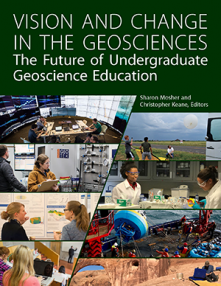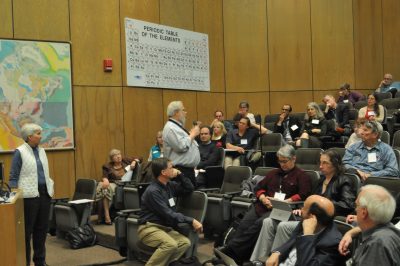New Report Offers Roadmap for Adapting Geoscience Education to Changing World
March 5, 2021

As society grapples with big questions on climate, energy, the environment and natural resources, one thing is clear: the world needs geoscientists to help find answers.
A new report, spearheaded by The University of Texas at Austin Jackson School of Geosciences and published by the American Geosciences Institute on March 3, offers a guide for educating undergraduate geoscience students so they are prepared to tackle these questions and adapt to a rapidly changing field.
The report comes after six years of summits, workshops, and surveys that collected input and feedback from more than 1,000 members of the geosciences community, both in academia and industry. The document presents a consensus view on the future needs and approaches for educating future geoscientists.
“In this report, the community has come together to address the critical roles academic institutions play in educating the next generation of diverse geoscientists to address societal challenges,” said Jackson School Professor Sharon Mosher, who recently stepped down as dean in 2020 after more than a decade at the helm. “I hope this effort enables change in geoscience programs across the broad spectrum of institutions and will be useful to departments that may be facing challenges.”

Mosher is the report’s principal investigator and the driving force behind the project, hosting summits and workshops on the future of geoscience education. The first summit was in 2014, and brought together a broad spectrum of the geosciences community to discuss undergraduate education. This was followed by a 2015 summit for geoscience employers, and a 2016 summit for department heads and chairs from two-year and four-year colleges and universities. Attendees of the 2016 summit met again in 2017 to discuss their progress at a workshop at the Earth Educators Rendezvous. The initiative expanded to include graduate education with a 2018 geoscience employers workshop and a 2019 summit for department heads and chairs of research universities.
The 13-section report addresses the drivers, needs, and strategies for preparing future generations of geoscientists. It covers a wide range of topics in key geoscience concepts, pedagogy, and preparing students for future careers. It also confronts challenges in recruitment, increasing diversity, and facilitating change in geoscience departments.

A core theme of the report is that the largest challenges facing society have geosciences at their root and that skills inherent to geosciences – such as working with complex systems, temporal and spatial reasoning, and the collection, interpretation, and analysis of complex natural data — are among the most crucial approaches to addressing them.
The full text of the report and a free PDF version are available at: https://www.americangeosciences.org/change. Print copies can be purchased through Amazon.com.
In addition, the report website includes a toolkit with materials for supporting and fostering change in geoscience departments.
The development of this report was supported by the National Science Foundation Any opinions, findings, and conclusions or recommendations expressed in the report are those of the authors and do not necessarily reflect the views of the National Science Foundation.
For more information, contact: Anton Caputo, Jackson School of Geosciences, 512-232-9623; Monica Kortsha, Jackson School of Geosciences, 512-471-2241.
